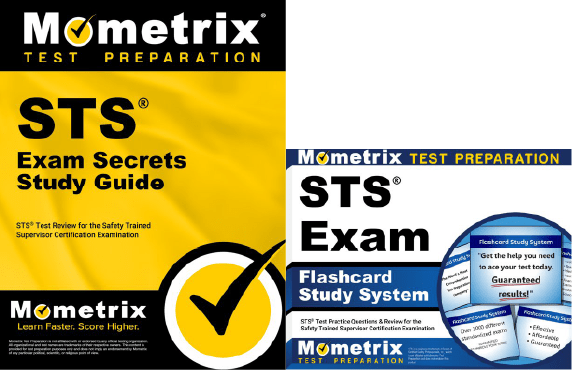If you need help studying for the STS® exam or just want some more information about what the test is like, you’ve come to the right place.
Click below to take a free STS practice test!
STS Exam Eligibility
Before you can register to take the STS exam, you’ll have to meet at least ONE of the requirements below:
- You need at least two years of supervisory experience.
- You need at least four years of work experience at a minimum of 18 hours per week in any industry.
- You need at least an associate degree in occupational safety, construction management, or risk management.
- You need to complete a two-year union or trade training program or apprenticeship.
If you meet one of these requirements, you’re set to begin the registration process!
What’s on the Exam?
First, let’s talk about the questions on the exam. There are 100 multiple-choice questions total, but only about 90 of the questions will count toward your score. Why is that?
The 10-15 unscored questions on the STS exam are “experimental” questions. These are added to the exam to determine if they’re good enough questions to add to future versions of the test.
The trick is that you won’t have any way of knowing which questions are scored and which ones are experimental. They will appear just like the scored questions throughout the test.
The time limit for the exam is 2 hours. There aren’t any scheduled breaks, but you’re free to take restroom breaks as needed.
Let’s take a closer look at the different domains of the STS exam.
1. Safety Program Implementation and Management
20.3% of the exam
- Safety training
- Energy isolation
- Job safety/hazard analysis
- Incident investigations, documentation, and corrective action
- Confined space
- Audits, inspections, and evaluations
- The Globally Harmonized System
- Personal protective equipment
- Equipment inspections
Skills
- Managing hazards by pre-planning work
- Addressing changing conditions in the job safety analysis
- Communicating the results of audits/inspections
- Taking action on safety non-conformance
2. Safety and Health Hazards
23.6% of the exam
- Excavations
- Ladders
- Heavy equipment
- Pressurized systems
- Poor housekeeping
- Motor vehicle operations
- Hand tools
- Power tools
- Working at heights
- Hot work
- Cranes and lifting devices
- Elevated work platforms
- Compressed gas storage and use
- Moving parts and pinch points
- Industrial lifting vehicles
- Office environments
- Rigging and hoisting
- Walking surfaces
- Distractions
- Electrical work
3. Hazard Controls
20.3% of the exam
- Excavations
- Safety systems
- Acute health hazards
- Compressed gas storage and use
- Industrial lifting vehicles
- Working at heights
- Chronic health hazards
- Motor vehicle operations
- Heavy equipment operations
Skills
- Ensuring hazardous materials/chemicals are handled and stored properly
- Applying energy isolation controls
- Correcting unsafe conditions or acts
4. Basic Industrial Hygiene
11% of the exam
- Post-incident procedures
- When to seek assistance with a hazard or situation
- Industrial hygiene
- Hazards associated with improper ergonomics
- Basic waste management
- Environmental conditions that impact health and safety
- Noise hazards
- Handling and storing hazardous materials/chemicals
5. Emergency Preparedness and Management
14.3% of the exam
- Fire safety requirements
- Fire protection methods and classifications
- Emergency response plans and drills
6. Ethical Leadership
10.5% of the exam
- Principles
- Leadership
- Integrity
- Diversity and Bias
How to Register
Once you’ve ensured that you meet all of the eligibility requirements, you can register for the exam.
To get started, you’ll need to submit an application on BCSP’s website, which involves submitting a $120 application fee.
Once your application is approved, you will have a full year to register and sit for the exam.
STS Exam Scores
The STS exam is scored using two methods: the modified-Angoff method and the Bookmark Standard Setting method.
Here’s how they work:
This method involves a handful of experienced professionals estimating how many test-takers who know the bare minimum would get each question right. These guesses lead to the experts setting a passing score that reflects the knowledge level of a qualified candidate.
Bookmark Setting Method
For this method, experts sort the exam questions from easiest to hardest and then place a “bookmark” at the point where they think passing should be. This determines the minimum score needed to pass based on this critical point.
Retaking the Exam
If you didn’t get a passing score on your first try, that’s okay! As long as your eligibility requirements remain valid, you may take the exam as many times as you want, with a six-week waiting period between attempts.
Keep in mind that you will have to pay the full testing fee every time you retake the test.
FAQs
How many questions are on the STS exam?
There are 100 multiple-choice questions on the exam.
How long is the STS exam?
The exam is timed at 2 hours.
How much does the STS exam cost?
The testing fee is $185.
What is the passing score for the STS exam?
You need to answer at least 70% of the questions correctly to pass the exam.
STS is a registered trademark of Board of Certified Safety Professionals, Inc., which is not affiliated with Mometrix Test Preparation and does not endorse this page.



 STS Study Guide
STS Study Guide STS Flashcards
STS Flashcards